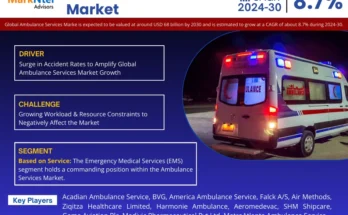Overview and Scope
Cardiac valves refer to artificial valves used to keep the flow of blood in one direction from the heart to the rest of the body parts. A cardiac valve is an implantable device used to replace a damaged body valve that has stopped working due to various diseases. The primary function of the cardiac valve is to keep blood flowing in the proper direction through the heart and from the heart into the major blood vessels connected to it.
Sizing and Forecast
The cardiac valve market size has grown rapidly in recent years. It will grow from <b>$9.68 billion in 2023 to $11.17 billion in 2024 at a compound annual growth rate (CAGR) of 15.3%. </b> The growth in the historic period can be attributed to aging population and the associated increase in valvular heart disease, growth in the prevalence of risk factors like obesity and hypertension, improved diagnostic and imaging technologies for valve diseases, awareness campaigns and education on heart health and valve disease, and development of minimally invasive and transcatheter valve procedures.
The cardiac valve market size is expected to see rapid growth in the next few years. It will grow to <b>$18.87 billion in 2028 at a compound annual growth rate (CAGR) of 14.0%. </b> The growth in the forecast period can be attributed to increasing demand for bioengineered and tissue-engineered heart valves, aging global population and the need for valve disease treatment, telemedicine and remote patient monitoring for valve patients, enhanced surgical techniques and robotics-assisted valve procedures, and adoption of 3d printing for personalized heart valve manufacturing. Major trends in the forecast period include advancements in valve replacement and repair techniques, integration of artificial intelligence (ai) for valve disease detection and treatment planning, adoption of 3d printing for personalized heart valve manufacturing, advancements in valve replacement and repair techniques, and enhanced surgical techniques and robotics-assisted valve procedures.
To access more details regarding this report, visit the link:
https://www.thebusinessresearchcompany.com/report/cardiac-valve-global-market-report
Segmentation & Regional Insights
The cardiac valve market covered in this report is segmented –
1) By Type: Tissue Heart Valves, Transcatheter Heart Valves, Mechanical Heart Valves, Other Types
2) By Position: Aortic Valve, Mitral Valve, Other Positions
3) By Treatment: Cardiac Valve Repair, Cardiac Valve Replacement
4) By End-Users: Hospital And Clinics, Specialty Centers, Cardiac Research Institute, Other End Users
<b>North America</b> was the largest region in the cardiac valve market in 2023. <b>Asia-Pacific</b> is expected to be the fastest-growing region in the forecast period. The regions covered in the cardiac valve market report include Asia-Pacific, Western Europe, Eastern Europe, North America, South America, Middle East and Africa.
Intrigued to explore the contents? Secure your hands-on sample copy of the report:
https://www.thebusinessresearchcompany.com/sample.aspx?id=7753&type=smp
Major Driver Impacting Market Growth
The rising incidence of cardiovascular diseases is expected to propel the growth of the cardiac valve market. The prevalence of cardiovascular disease has gradually increased due to smoking, obesity, a lack of physical activity, and other factors that strain the cardiovascular system. The most common cause of coronary artery disease is arteries’ build-up of fatty plaques. These gradual increases in heart-related diseases raised the demand for the cardiac valve to treat heart valve problems. For instance, in September 2023, according to the World Health Organization, a Switzerland-based specialized agency of the United Nations, there were 41 million deaths, which is 74% of those caused by non-communicable diseases (NCDs) or chronic diseases every year globally. There were 17.9 million deaths from cardiovascular diseases, 9.3 million deaths from cancer, 4.1 million deaths from chronic respiratory diseases, and 2.0 million deaths from diabetes. . Therefore, the rising incidence of cardiovascular diseases will drive the growth of the cardiac valve market.
Key Industry Players
Major companies operating in the cardiac valve market include <b> LivaNova plc, Abbott Laboratories, Colibri Heart Valve LLC, TTK HealthCare Limited, Artivion Inc., Edwards Lifesciences Corporation, Boston Scientific Corporation, Symetis SA, Jenavalve Technology Inc., CryoLife Inc., Lepu Medical Technology Co. Ltd., Braile Biomedical, Sorin Group, Micro Interventional Devices Inc., Medtronic Inc., Lepu Medical Technology, Edward Lifesciences Corporation, Neovasc Inc., Xeltis AG, JenaValve Technology, Braile Biomédica Ltd., Medtronic plc, Meril Life Sciences Pvt. Ltd., Auto Tissue Berlin GmbH, On-X Life Technologies Inc., Thubrikar Aortic Valve Inc., LifeNet Health Inc. </b>
The cardiac valve market report table of contents includes:
1. Executive Summary
2. Cardiac Valve Market Characteristics
3. Cardiac Valve Market Trends And Strategies
4. Cardiac Valve Market – Macro Economic Scenario
5. Global Cardiac Valve Market Size and Growth
.
.
.
31. Global Cardiac Valve Market Competitive Benchmarking
32. Global Cardiac Valve Market Competitive Dashboard
33. Key Mergers And Acquisitions In The Cardiac Valve Market
34. Cardiac Valve Market Future Outlook and Potential Analysis
35. Appendix
TOp Major Players:
LivaNova PLC
Abbott Laboratories
Colibri Heart Valve LLC
TTK HealthCare Limited
Artivion Inc.
Explore the trending research reports from TBRC:
Contact Us:
The Business Research Company
Europe: +44 207 1930 708
Asia: +91 88972 63534
Americas: +1 315 623 0293
Email: info@tbrc.info
Follow Us On:
LinkedIn: https://in.linkedin.com/company/the-business-research-company
Twitter: https://twitter.com/tbrc_info
Facebook: https://www.facebook.com/TheBusinessResearchCompany
YouTube: https://www.youtube.com/channel/UC24_fI0rV8cR5DxlCpgmyFQ
Blog: https://blog.tbrc.info/
Healthcare Blog: https://healthcareresearchreports.com/
Global Market Model: https://www.thebusinessresearchcompany.com/global-market-model




